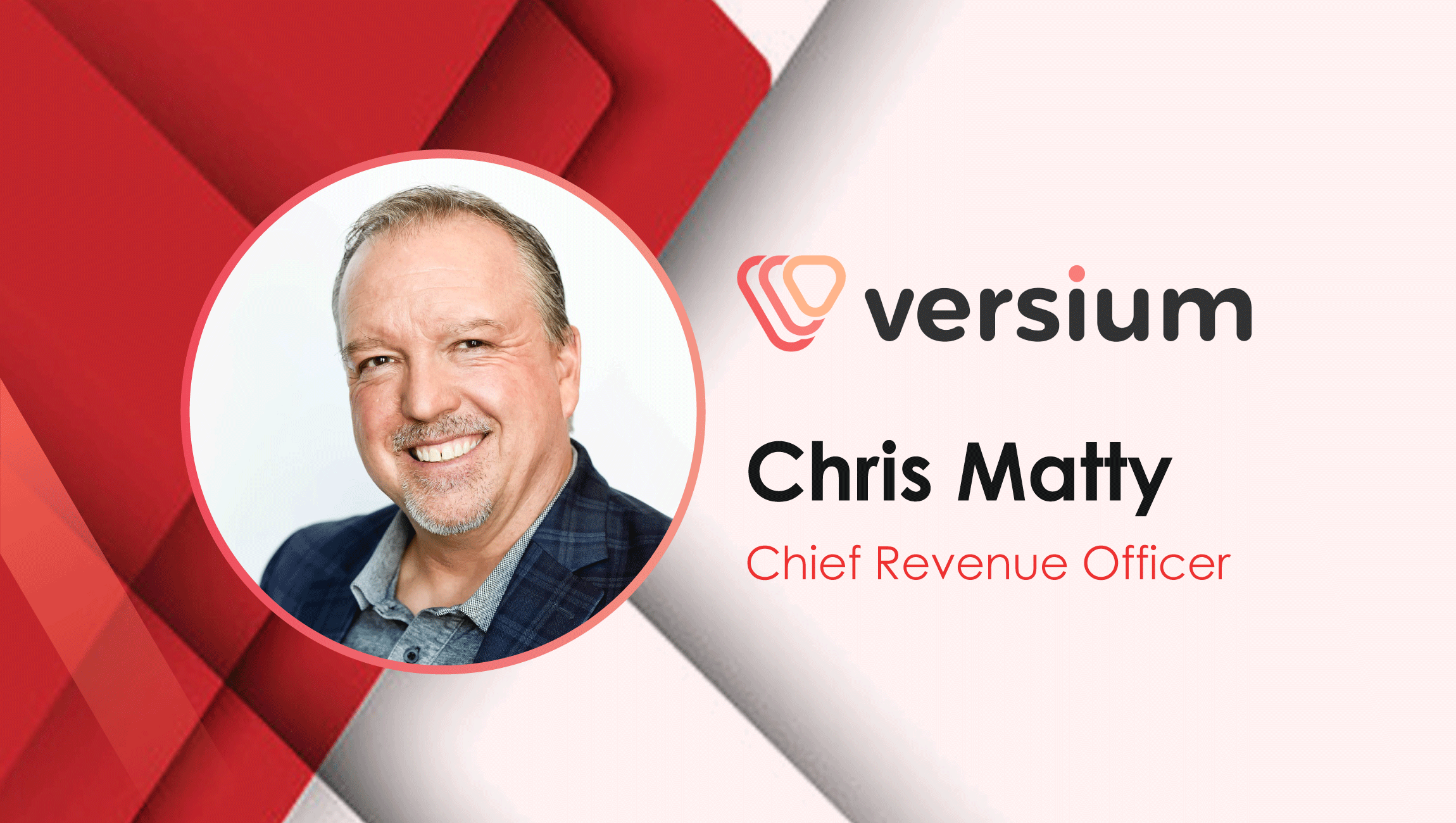Chris Matty, Chief Revenue Officer at Versium, Inc. comments more on how the rise of AI and consolidation within martech is set to change norms for the B2B martech industry:
___________
Welcome to this MarTech Series chat, Chris, tell us about yourself and the story behind Versium…
After completing my MBA at 26, I joined a well-funded telecommunications startup, where I learned how to turn ideas into successful ventures. My boss encouraged me to treat the operation as my own business, empowering me to make decisions. This taught me the importance of hiring talented individuals and empowering them to excel. After receiving an irrelevant ad for a Brazilian wax service over 45 miles away from my home, I was inspired to help marketers reach their target audience more effectively. This led me to create Versium.
My founding story at Versium is one of empowerment, driven by the belief in talented individuals and a passion to transform marketing. With innovation and a commitment to empowering marketers, we embarked on a transformative journey to help marketers maximize the value of customer and people data and its use in marketing.
How has Versium’s platform and overall offering evolved over the years: we’d love to hear about some of the latest enhancement to your REACH platform as well and how it benefits end users?
In just the past year, Versium has expanded its all-in-one platform to support marketers at every step of their data journey. From a single, trusted provider, marketers can now cleanse, enrich, model and activate marketing data via Versium’s REACH UI or robust set of APIs.
Versium REACH has been trusted by thousands of customers to enrich their data for better targeting and improved marketing performance. Now, Versium has expanded its platform even further to help marketers with the first crucial step toward actioning their data – cleansing. Versium’s Data Prep tool is designed for businesses that need to manage and fix large amounts of identity data but don’t have the resources or expertise to do so effectively. Data Prep rapidly diagnoses large volumes of data and automatically fixes errors, such as missing fields, inconsistent formatting, typos and more, preparing data for further enrichment or even AI models. Data Prep uses AI models to parse identity data such as location, job titles and names, to ensure consistency across large volumes of data.
Versium also recently released new open-source tools to help developers and data scientists model and optimize for marketing campaigns. Versium Model Builder integrates with Versium’s insights data set to enhance first-party audience data and improve predictive power, fills in the blanks where attributes are lacking and automatically creates models and surfaces insights to enable personalized messaging. Versium Record Scorer executes a score for each contact on how likely they are to convert, in order to improve targeting toward prospects most likely to purchase or engage.
Marketing Technology News: Martech Interview with Jim Kraus, President, Buyer Persona Institute (BPI)
When it comes to omnichannel marketing today, what are the core challenges you still see a lot of marketers and brands struggle with?
One significant challenge omnichannel marketers still struggle with today is optimizing their first-party data across various channels, such as email, digital, and direct mail, to synchronize activities and reach the same people in different places most efficiently. Getting the most out of first-party data has become the highest priority for marketers with the demise of third-party cookies, and yet, a staggering 91% of companies experience the negative impact of outdated, erroneous, or imprecise data.
This is not only detrimental to marketing campaigns, but bad data results in an estimated loss of over $3 trillion annually. If there are issues like outdated email addresses, typos or fake contact info, the effectiveness of the campaign is compromised.
To truly be omnichannel marketing, campaigns need to touch the same people with the same targeted messaging through multiple channels, leveraging their own audience lists and activating them effectively – not just advertising on different channels to different people. This requires enriching the audience data and ensuring that media spend in each channel reaches the same people. It all starts with robust, up-to-date, and validated first-party data, as this forms the foundation for reaching the most people and reinforcing marketing efforts across platforms. Neglecting data quality can lead to missed opportunities, with potential campaigns only reaching a fraction of the intended audience.
If you could bust a few myths surrounding omnichannel marketing, what would they be?
There are several myths surrounding omnichannel marketing that need to be debunked. Firstly, it is not enough to simply push data to all platforms. Effective results require synchronization across channels. Secondly, omnichannel goes beyond using multiple channels independently; it entails targeting the same audience and ensuring synchronization for maximum impact. Thirdly, timing plays a crucial role in reinforcing the message, so consistency across channels is essential. Another myth is that only big businesses can benefit from omnichannel strategies. In reality, there are effective tools available for small audiences and regional targeting, making it accessible to businesses of all sizes. Lastly, the belief that omnichannel marketing is expensive is false. Cost-efficient mechanisms and self-service tools are now available, eliminating the need for expensive professionally managed service engagements and making it feasible for businesses with varying budgets.
Can you share a few thoughts on how some of the world’s leading brands seamlessly use strong processes and martech/salestech tools to tie in to better omnichannel experiences?
Leading brands leverage strong processes and martech/salestech tools to seamlessly enhance omnichannel experiences. They focus on common customer journeys and use audience segmentation and cohorts with distinct characteristics to ensure consistent targeting and messaging across various channels. By segmenting their audience, these brands can tailor creatives and messages to specific segments, maintaining a personalized experience throughout the customer journey across retail, online, and mobile app experiences, ensuring a cohesive story. These leading brands create a harmonious and cohesive omnichannel experience for their customers, resulting in enhanced engagement, loyalty, and ultimately, better business outcomes.
Marketing Technology News: How Web3 Is Revolutionizing Loyalty
If you had to share five thoughts about the state of martech in 2023 and beyond, what would it be?
- Consolidation: The market is witnessing a consolidation trend as marketers prefer having fewer vendors and logins, and instead seek platforms that can manage multiple marketing workflows. A desire for a data processing workbench that addresses various data concerns within martech is emerging.
- Emphasis on First-Party Data: The importance of first-party data is growing. Marketers recognize the value of leveraging their own data to drive insights, personalization, and targeted marketing campaigns.
- Rise of AI and Machine Learning: The adoption of AI and machine learning technologies continues to rise. These advanced technologies enable marketers to gain deeper customer insights, automate processes, and deliver more personalized experiences at scale.
- Omnichannel Growth: The significance of omnichannel experiences is increasing. Marketers are focusing on seamlessly integrating and delivering consistent messaging and experiences across various channels to engage customers at every touchpoint.
- Privacy Considerations: Privacy concerns are becoming more prominent. Marketers and businesses must provide clear and concise privacy policies to address customer concerns and establish trust in an era of heightened data privacy awareness.
Versium transforms data into a strategic asset that improves marketing performance. Versium’s all-in-one data technology platform helps teams cleanse, enrich and action their data through easy-to-use tools, a robust set of APIs and the richest identity graph and insights engine that includes over 2 billion contact points. Versium has helped thousands of businesses along every step of their data journey, thereby increasing audience reach by up to 5X and engagement by up to 10X.
Chris Matty, Founder and Chief Revenue Officer at Versium, Inc., is an inspirational and creative executive with expertise in leading technology ventures to rapid market penetration and high revenue growth. His tactical specialties include executive management, business development, sales and sales management, negotiation, contract development, and strategic marketing and planning within the internet, SaaS, and Data & Telecommunications industries.
Missed The Latest Episode of The SalesStar Podcast? Have a quick listen here!
Episode 176: B2B Marketing Tips with Inbar Yagur, Director of Content and Product Marketing at Lusha
Episode 175: Go-to Market and Marketing Best Practices with Bryan Law, CMO at Zoominfo
Episode 174: B2B Customer Engagement with Mike Molinet, Co-Founder, Thena












